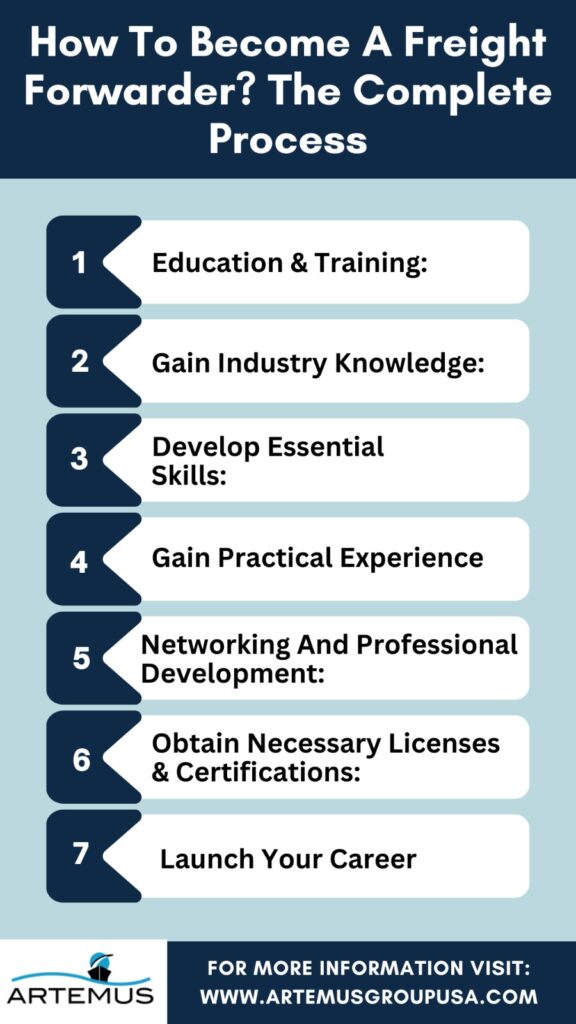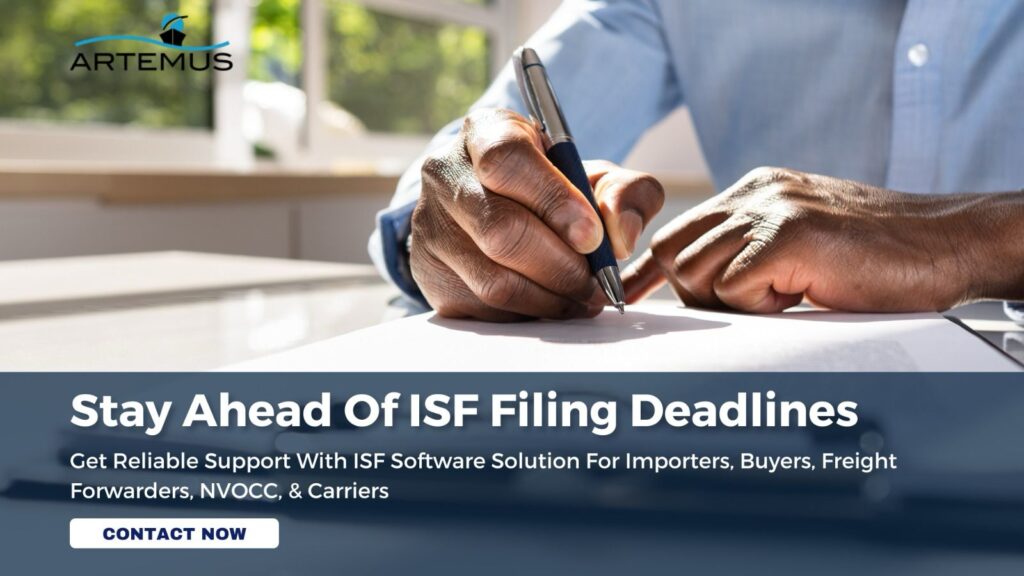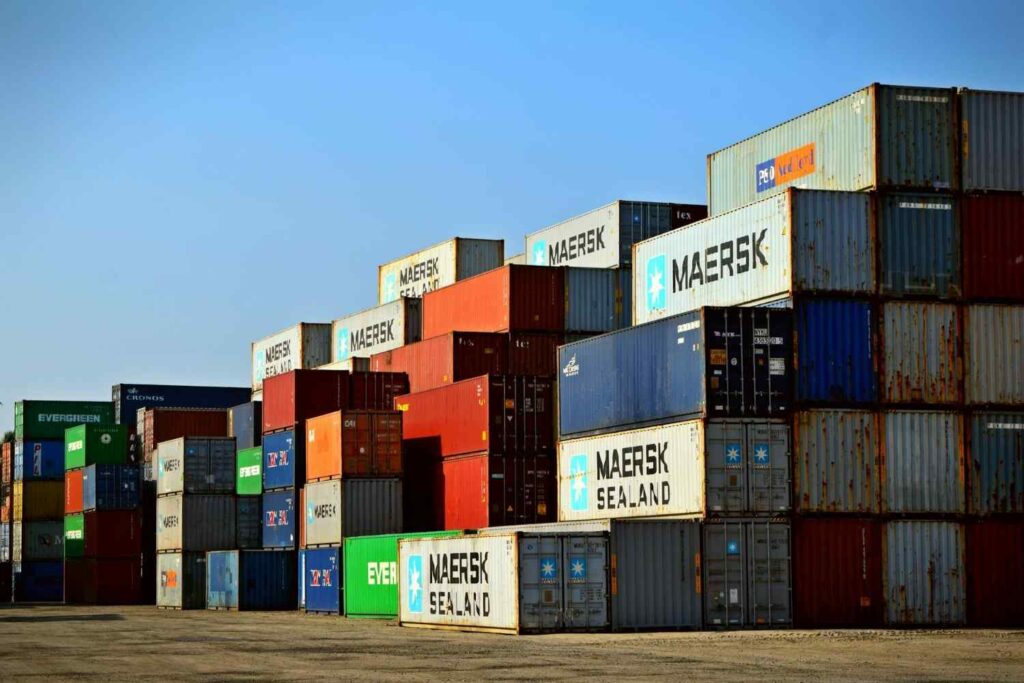
What Is Inbound Logistics & Outbound Logistics? A 2025 Guide
In the dynamic world of supply chain management, understanding the nuances of inbound and outbound logistics is crucial for operational

Embarking on a career as a freight forwarder opens doors to a dynamic and essential role in the global logistics industry. As key players in facilitating the movement of goods across borders, freight forwarders play a crucial role in ensuring the smooth flow of international trade. But how does one become a freight forwarder, navigating through the complexities of logistics, regulations, and global supply chains?
In this guide, we’ll explore the essential steps and considerations for aspiring individuals looking to carve their path into the world of freight forwarding. Additionally, Artemus Transportation Solutions stands as a beacon of innovation in the industry, offering a specialized ISF (Importer Security Filing) Software Solution tailored specifically for freight forwarders.
Table Of Contents
Freight forwarding serves as a pivotal link in the intricate web of global trade, facilitating the movement of goods from one location to another with efficiency and precision. At its core, freight forwarding involves the coordination and management of various logistical aspects, including transportation, documentation, and customs clearance, to ensure seamless delivery of cargo from origin to destination.
Essentially, freight forwarders act as intermediaries between shippers and carriers, leveraging their expertise to optimize routes, minimize costs, and navigate regulatory requirements effectively. Whether by air, sea, road, or rail, freight forwarders oversee the entire transportation process, from initial booking to final delivery, providing valuable support and guidance at every stage of the journey.
In essence, they serve as the orchestrators of international trade, facilitating the smooth flow of goods across borders and continents.
Related: What Does A Freight Forwarder Do? Functions & Future Trends
The role of a freight forwarder is multifaceted, encompassing a range of responsibilities crucial to the seamless movement of goods across the global supply chain. Here are some key points highlighting their pivotal role:
Related: NVOCC VS Freight Forwarder: Differences & Who To Choose?

Becoming a freight forwarder entails a comprehensive process that involves acquiring the necessary education, skills, and industry knowledge, as well as gaining practical experience in the field of international logistics. Here is a step-by-step guide outlining the complete process of becoming a freight forwarder:
By following these steps and investing in continuous learning and professional development, you can embark on a rewarding career path as a freight forwarder and contribute to the efficient movement of goods in the global marketplace.
Related: Customs Broker VS Freight Forwarder: 5 Key Differences
Applying for a freight forwarding license in the United States involves navigating through a series of regulatory requirements and procedures set forth by various government agencies. Here is a step-by-step guide on how to apply for a freight forwarding license in the USA:
Familiarize yourself with the regulatory framework governing freight forwarding activities in the United States. This includes regulations enforced by agencies such as the Federal Maritime Commission (FMC) and the Transportation Security Administration (TSA).
Identify the specific type of freight forwarding license you need based on the services you intend to provide and the modes of transportation involved (e.g., ocean freight, air freight, or both).
Ensure that you meet the eligibility criteria set forth by the relevant regulatory agencies for obtaining a freight forwarding license. This may include requirements related to citizenship, residency, financial stability, and business integrity.
Obtain the necessary application forms from the appropriate regulatory agency or licensing authority. These forms typically require detailed information about your business structure, ownership, financial standing, and operational plans.
Gather and submit supporting documents as required by the licensing authority. This may include proof of insurance, financial statements, business licenses, and any other documentation requested in the application form.
Pay the required application fees associated with obtaining a freight forwarding license. The fee amount may vary depending on the type of license and the regulatory agency overseeing the licensing process.
Be prepared to undergo background checks as part of the licensing process. This may involve criminal background checks, financial background checks, and other screenings to ensure compliance with regulatory requirements.
Depending on the licensing authority and the specific circumstances of your application, you may be required to attend interviews or hearings to provide additional information or address any concerns raised during the review process.
After submitting your application and supporting documents, await the review and approval process by the licensing authority. This may take several weeks or months, depending on the complexity of your application and the workload of the regulatory agency.
Once your application is approved, you will receive your freight forwarding license from the licensing authority. Ensure that you comply with any ongoing reporting requirements, renewal deadlines, or regulatory obligations associated with maintaining your license.
Related: Freight Forwarder Software: Key Features & Solutions
To operate a freight forwarding business in the UK, obtaining the necessary license is essential. This process involves navigating regulatory requirements set by HM Revenue & Customs (HMRC) and the Department for Transport (DfT). Below are the steps involved in applying for a freight forwarding license in the UK.
Related: How Long Does Customs Clearance Take? Key Takeaways
In the European Union, the process of applying for freight forwarder licenses involves registration with the national customs authority of the country where the business is located. Here’s a detailed overview of the steps involved:
Related: Customs Compliance Software: Key Benefits & Top Suggestions
Becoming a freight forwarder entails various expenses associated with education, training, licensing, and operational setup. Firstly, educational expenses include costs for acquiring relevant degrees or certifications in logistics, supply chain management, or international trade. The expenses can vary widely, spanning from a few thousand to tens of thousands of dollars, contingent upon the institution and program duration.
Additionally, specialized courses or certifications specific to freight forwarding, such as those offered by professional organizations like FIATA or IATA, may incur additional expenses ranging from $500 to $5,000 or more.
Licensing and regulatory expenses constitute another significant portion of the total costs. This includes application fees for obtaining freight forwarding licenses from governmental authorities, which can vary widely depending on the jurisdiction but typically range from $500 to $5,000. Moreover, maintaining compliance with ongoing licensing requirements, such as renewal fees and continuing education, can incur additional annual costs ranging from a few hundred to a couple of thousand dollars.
Additionally, there are operational expenses involved in setting up and running a freight forwarding business, such as office rent, utilities, staff salaries, insurance premiums, and technology infrastructure, which can vary greatly depending on the scale and location of the business. Overall, the total expenses for becoming a freight forwarder can range from several thousand to tens of thousands of dollars, depending on factors such as education, licensing, and operational setup.
Related: ISF Filing: A Compliance-Related Guide & Software Solution

Artemus Transportation Solutions provides an innovative ISF (Importer Security Filing) Software Solution tailored specifically for freight forwarders. This comprehensive software solution streamlines the Importer Security Filing process, enabling freight forwarders to efficiently submit accurate and timely filings to U.S. Customs and Border Protection (CBP).
With Artemus’ ISF Software, freight forwarders can pursue seamless data entry, validate information against CBP requirements, and generate ISF filings seamlessly, reducing the risk of errors and ensuring compliance with regulatory mandates.
To become a freight forwarder in India, individuals typically need to acquire relevant education in logistics or international trade, gain practical experience through internships or entry-level positions in freight forwarding companies, and obtain necessary licenses or certifications from regulatory authorities such as the Directorate General of Shipping (DGS) or the Customs Department.
To set up a freight forwarder, you need to register your business, obtain necessary licenses and permits, establish relationships with carriers and suppliers, develop operational procedures, and invest in technology for managing logistics and documentation efficiently.
To enter the freight forwarding industry, you need to conduct thorough market research, acquire relevant expertise or partner with experienced professionals, establish connections with suppliers and carriers, obtain necessary licenses and permits, and develop a strategic business plan tailored to the specific needs of the industry.
Yes, it is legal to be a freight forwarder, but it typically requires obtaining the necessary licenses and permits from regulatory authorities, adhering to industry regulations, and conducting business in compliance with local and international trade laws.

Embarking on the journey to become a freight forwarder requires dedication, education, and practical experience. By acquiring relevant knowledge in logistics and international trade, gaining hands-on experience through internships or entry-level positions, obtaining necessary licenses and permits, and continuously staying updated on industry trends and regulations, individuals can pave their way into this dynamic field.
While the path to becoming a freight forwarder may pose challenges, the rewards are substantial. As orchestrators of global trade, freight forwarders play a vital role in facilitating the movement of goods across borders, contributing to the efficiency and growth of the international supply chain. With determination and perseverance, aspiring freight forwarders can embark on a fulfilling career journey in this dynamic and essential industry.
Related: What Is Global Trade Compliance & Its Key Components

In the dynamic world of supply chain management, understanding the nuances of inbound and outbound logistics is crucial for operational

In today’s interconnected world, businesses rely heavily on global trade to expand their markets, access new resources, and drive growth.

Importing goods for resale in the USA presents a lucrative business opportunity, but navigating the complexities of U.S. customs regulations,
Get In Touch
Artemus’ Software Solutions for ISF, AMS, Japan AFR, eManifest Canada, & Panama B2B filings.